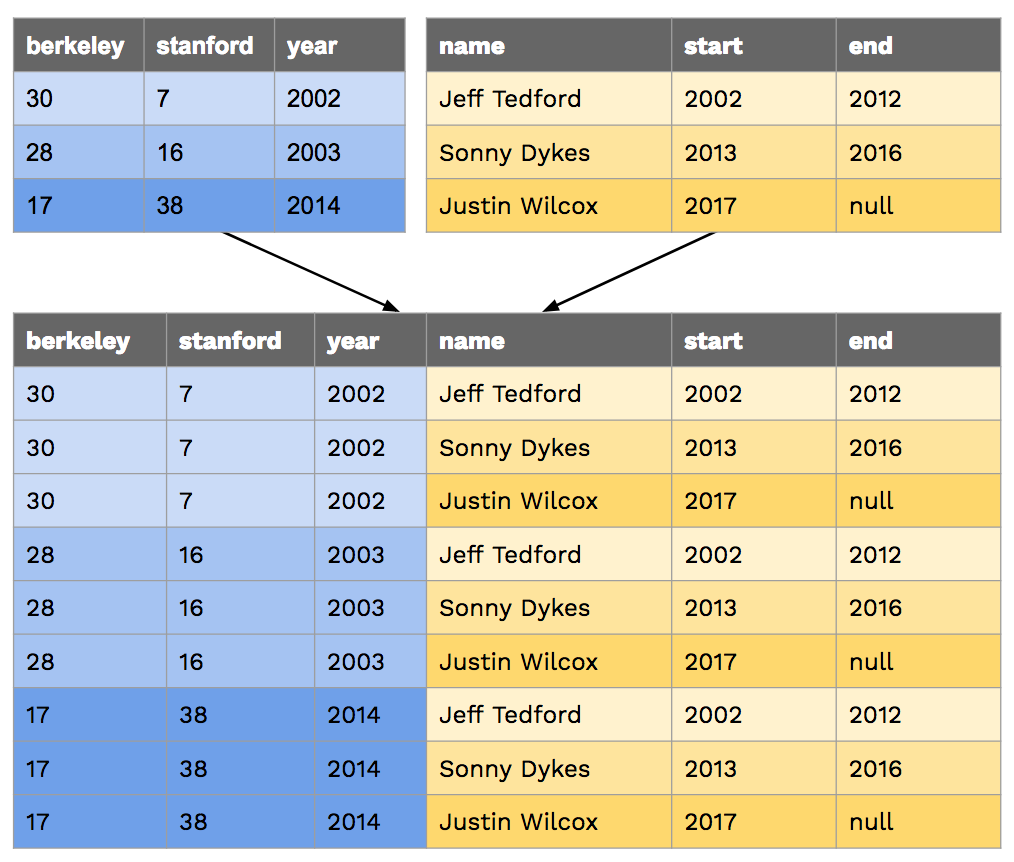Joins
To select data from multiple tables, we can use joins. There are many types of joins, but the only one we'll worry about is the inner join. To perform an inner join on two on more tables, simply list them all out in the FROM clause of a SELECT statement:
SELECT [columns] FROM [table1], [table2], ... WHERE [condition] ORDER BY [columns] LIMIT [limit];
We can select from multiple different tables or from the same table multiple times.
Let's say we have the following table that contains the names of head football coaches at Cal since 2002:
CREATE TABLE coaches AS
SELECT "Jeff Tedford" AS name, 2002 as start, 2012 as end UNION
SELECT "Sonny Dykes" , 2013 , 2016 UNION
SELECT "Justin Wilcox" , 2017 , null;
When we join two or more tables, the default output is a cartesian product (wiki or baidu). For example, if we joined big_game with coaches, we'd get the following:

If we want to match up each game with the coach that season, we'd have to compare columns from the two tables in the WHERE clause:
sqlite> SELECT * FROM big_game, coaches WHERE year >= start AND year <= end;
17|38|2014|Sonny Dykes|2013|2016
28|16|2003|Jeff Tedford|2002|2012
30|7|2002|Jeff Tedford|2002|2012
The following query outputs the coach and year for each Big Game win recorded in big_game:
sqlite> SELECT name, year FROM big_game, coaches
...> WHERE berkeley > stanford AND year >= start AND year <= end;
Jeff Tedford|2003
Jeff Tedford|2002
In the queries above, none of the column names are ambiguous. For example, it is clear that the name column comes from the coaches table because there isn't a column in the big_game table with that name. However, if a column name exists in more than one of the tables being joined, or if we join a table with itself, we must disambiguate the column names using aliases.
For examples, let's find out what the score difference is for each team between a game in big_game and any previous games. Since each row in this table represents one game, in order to compare two games we must join big_game with itself:
sqlite> SELECT b.Berkeley - a.Berkeley, b.Stanford - a.Stanford, a.Year, b.Year
...> FROM big_game AS a, big_game AS b WHERE a.Year < b.Year;
-11|22|2003|2014
-13|21|2002|2014
-2|9|2002|2003
In the query above, we give the alias a to the first big_game table and the alias b to the second big_game table. We can then reference columns from each table using dot notation with the aliases, e.g. a.Berkeley, a.Stanford, and a.Year to select from the first table.